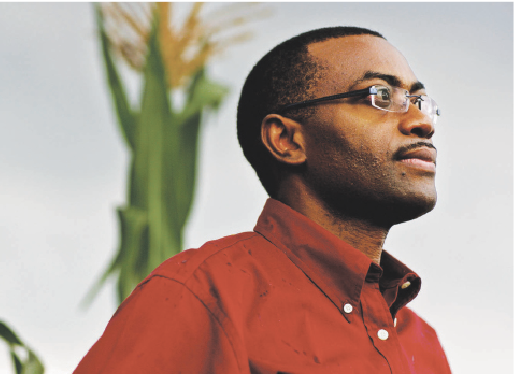Akinwunmi Adesina faces stiff contest in the ADB election billed to hold on May 28, writes Acting News Editor, ISHAYA IBRAHIM
After Nigeria lost its bid to the World Bank presidency through its Minister of Finance, Ngozi Okonjo-Iweala, another opportunity seems to be smiling on the country, which is unarguably Africa’s giant and the continent’s largest economy. It is one of the top contenders for the top job of the African Development Bank (ADB). Minister of Agriculture and Rural Development, Akinwunmi Adesina, is the man in the spotlight. But it is not an easy road for him.
Adesina faces seven strong contenders for ADB’s top job which election comes up on May 28, the eve of Muhammadu Buhari’s inauguration as Nigeria’s president.
The 55-year-old Agriculture minister has impressive academic qualifications to place him in good standing in the contest. He has a Ph.D in Agricultural Economics (1988) from Purdue University, United States of America, and was awarded the most outstanding Ph.D thesis. He had earlier bagged his Masters degree in Agricultural Economics from the same university, and Bachelor’s degree (First Class Honours) in Agricultural Economics, University of Ife (1981). So, in terms of competence, he is well positioned.
On garnering the votes, a number of efforts have been put in by the out-going administration of President Goodluck Jonathan and in-coming government of Buhari for his election.
Buhari has personally thrown his weight behind the minister, signalling that he has put behind him the hate electioneering of the March 28 presidential election by the incumbent administration which Adesina is part of. In the election, President Goodluck Jonathan was defeated.
On April 2, Buhari asked former Vice President Atiku Abubakar to visit South African President, Jacob Zuma, to shore up the chances of the Nigerian candidate.
Atiku’s media office later issued a statement saying: “Former Vice President Atiku Abubakar met President Zuma in the company of Dr. Akinwumi Adesina during which the directive of President-elect, General Muhammadu Buhari, was conveyed to Zuma. The issue of South Africa and the southern African region’s support for Nigeria’s candidate was exhaustively discussed and well appreciated.”
Earlier, the president-elect had appealed to President John Mahama of Ghana to rally support for Adesina in the election which is to hold in Abidjan, Cote d’Ivoire.
Dr. Tunde Oseni, lecturer at the Department of Politics and International Relations, Lead City University in Ibadan, Oyo State, said Buhari’s decision to support Adesina’s candidature was a pragmatic move.
“Every country in this world always acts on the basis of what is known as realism in political science. So, as a realist government, or as a realist in-coming government, the Buhari team feels that though Adesina is a Jonathan man, he can also be a man of Buhari if he becomes the African Development Bank president,” he said.
He explained how the Buhari’s in-coming government could benefit from the ADB, if Adesina is its president.
“One, Nigeria is called the biggest economy in Africa in terms of GDP (Gross Domestic Product). So, having a man from Nigeria at the helm of affairs at the African Development Bank will boost our economy in a way because Nigeria will not have to go cap-in-hand to maybe South Africa or to Ghana or to any other African country. You have your man right there. So it is easier for Buhari to approach Adesina who is a Nigerian than Buhari to approach a non-Nigerian president of the African Development Bank.
“Second, if you look at the performance of the man himself as agriculture minister, he has been one of the most performing ministers under the Jonathan administration. Buhari has promised to focus on agriculture and mining; so you need somebody who is also interested in agriculture and mining at the African Development Bank to help Nigeria with loans and some kind of financial support. So, I think Buhari is trying to play a realist approach; that is to say you have to be close to power or rather you have to be in power to benefit from an office. So I think as a Nigerian, and as an outgoing agriculture minister, Buhari’s administration is going to benefit immensely from an Adesina’s (ADB) presidency,” Oseni said.
There are seven contenders whose countries have also been lobbying for support for them from other African countries. They include: Sufian Ahmed (Ethiopia), Jaloul Ayed (Tunisia), Kordje Bedoumra (Chad), Cristina Duarte (Cape Verde), Samura M. W. Kamara (Sierra Leone), Thomas Z. Sakala (Zimbabwe) and Birama Boubacar Sidibe (Mali).
If regional sentiment were to play a part in the election, the chances of the West Africans in the race could be dim. This is because the region has four contenders and this may split the vote among Adesina (Nigeria), Duarte (Cabo Verde), Kamara (Sierra Leone) and Sidibe (Mali). This may then boost the chances of Ahmed (East Africa), Ayed (North Africa) and Sakala (Southern Africa) whose regions have one candidate each.
Oseni is not worried about the regional split. He said Nigeria in ADB is like the United States in the World Bank.
“So, Nigeria has the clout, the power and the influence over all of West African region which can rally behind Nigeria,” he said.
According to him, Buhari’s intervention on South Africa could bolster Nigeria’s chances.
“Buhari has also sent Atiku to Zuma in South Africa. If South Africa supports Nigeria, that will add weight because South Africa is the regional power in southern Africa, just like Nigeria is the regional power in West Africa. So, if South Africa supports Nigeria, it means, more or less, the whole of southern Africa, including Botswana, Zambia, and Malawi, are supporting Nigeria. So, if South Africa can convince its regional allies, it means therefore that Nigeria’s chances of getting that job is very very bright, and probably over 70 per cent,” Oseni said.
Adesina believes that his candidature cuts across regional divide. He told the Voice of America (VOA) in an interview that his many years of work in Francophone and Anglophone countries, coupled with his passion to help eradicate poverty in Africa, qualifies him to become the next ADB president.
He also expressed some bright ideas which he intends to implement if he wins the ADB presidency.
First is to focus on smart infrastructure to allow increased productivity and efficiency in growth, to work on the private sector for wealth creation. The third is jobs for Africa’s youth and jobs for Africa’s women. The fourth area I am going to put a lot of emphasis on is reviving rural economies to create shared prosperity and inclusive growth of the continent and, finally, regional integration and prosperity,” Adesina said.
On regional integration, he argued: “Africa has no choice than to integrate because if you look at the size of our every single country, it is a very small market. But we can trade a lot more among ourselves. The amount of trade among African countries is very low; it is 12 per cent compared to over 48 per cent in Asia, about 47 per cent in the North America free trade area and almost 70 per cent in Europe,” Adesina said.
















